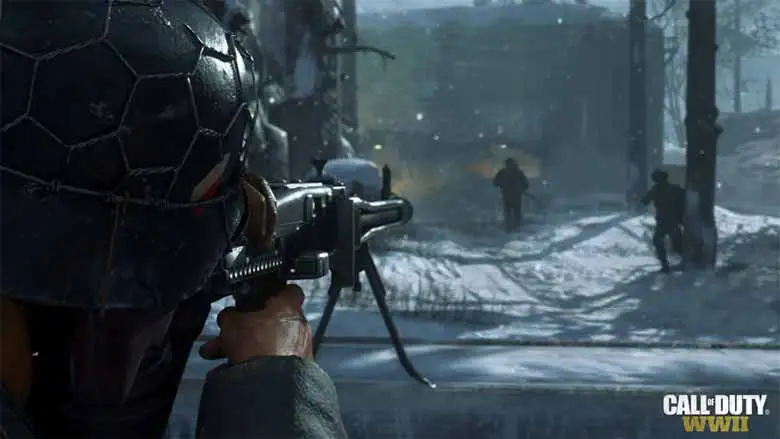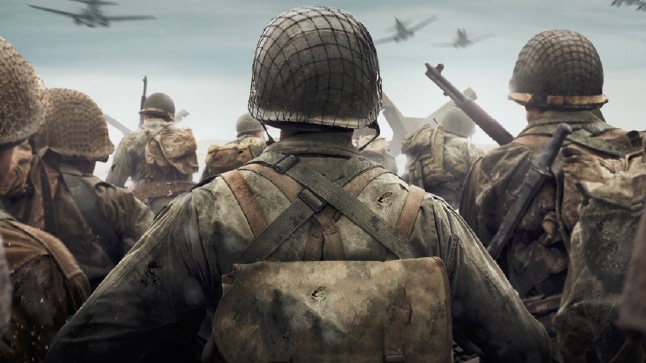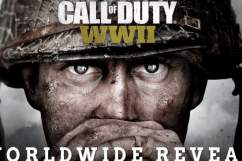
Wilbert Roget II Wilbert Roget II, Call of Duty: WWII's Composer
Wilbert Roget II’s career as a video game composer is partly accidental.
He told Forbes that one day after becoming a music editor for LucasArts in 2008, he accidentally overheard that they were looking for an additional composer for Star Wars: The Old Republic. So he wrote a demo piece, showed it to the music supervisor and eventually was asked to write about an hour of music for the game. He was then promoted to composer and associate music supervisor at the development company in 2010 just before the launch of the game.
After LucasArts was shut down by Disney in 2013, with all future video game development going to third party studios like EA, Roget worked as a freelance composer for projects like Lara Croft: Temple of Osiris, Dead Island 2, and Guild Wars 2: Path of Fire. By far his biggest project to date is the soundtrack for the recently released Call of Duty: WWII.
Roget was able to discuss with Heavy via email about his inspirations, his composing process and more.
It says on your bio that you were inspired by classic Japanese game soundtracks. What was it about them that inspired you so much?
I actually started gaming fairly late. My first console system was the PlayStation 1, and my high school years were spent playing games like Final Fantasy 7, Xenogears and Vagrant Story. They had deep, innovative stories and gorgeous artwork, but I was particularly impressed by how memorable and evocative the soundtracks were. I’d been a pianist for over a decade by that point, but it wasn’t until I played these games that I realized I wanted to write original music – specifically, music for games. There was a simple, inviting quality to these scores, with the limited hardware making for arrangements that were easy to deconstruct and understand. I learned how to compose by transcribing several of these pieces by ear, learning firsthand how the instrumentation, form and melody worked.
What’s the most important part of making a song memorable?
If there were a simple answer to this, we’d all be millionaires! But I would say one of the most vital elements is just simply drama. It’s important to balance expectation and surprise, satisfying what a new listener wants to hear while also giving them something fresh and interesting. Having a singable melody is part of it, but more abstractly I think it’s this concept of keeping a first-time listener’s expectations in mind at all times while writing. Your job is to take them on a journey through each piece, no matter what kind of music you’re writing.
Your bio says you balance modern production with classical construction when creating musical pieces. What do you mean by this?
I’m somewhat traditional in my approach to composition, in that I always start with pencil and paper sketches rather than diving right into the computer. I find this lets me be more freely creative, without worrying too much about the specifics of how I’d actually pull off a certain sound. Additionally, my melodies and harmonic progressions tend to do most of the heavy lifting in telling the story, rather than textural elements. Some say this gives my scores a more old school feel as well. That said, I frequently use synthesized and electronic elements in my scores in tandem with the acoustic sounds, which gives them a contemporary vibe as well.

After LucasArts was shut down in 2013, you became a freelance composer. What’s the difference between being a staff composer and a freelance one?
As a freelance composer, much of my job is finding the next project, negotiating deals and keeping up with potential clients – whereas at LucasArts, all of those elements were basically a given. In other words, much of the difference involves how much business acumen is needed. That said, compositionally there are certain advantages to both. My final project at LucasArts was the unreleased Star Wars: First Assault, an FPS title where I was both the composer and music supervisor; this allowed me to take certain creative risks that would be very difficult to pull off as a freelancer. But as a freelancer, I’ve worked on a very wide variety of games, writing music in several different genres and never being forced into one particular sound.
Do you miss anything about working for LucasArts?
While I certainly prefer the freelance composer life, I think the biggest thing I miss about LucasArts is definitely my co-workers. We had an incredible team, and especially towards the end with the First Assault project, we were all very close and tightly-knit. I think our core team in San Francisco had only 40-50 people, so we had the agility and camaraderie of a small game studio and made some great friendships along the way. I still keep up with many of those old teammates now that everyone has moved on to various other companies though, and in fact a few of them worked on Call of Duty: WWII, Lara Croft and other post-Lucas titles I’ve worked on.
You’ve composed for many fantasy-oriented games like Star Wars: The Old Republic and Guild Wars 2: Path of Fire. However, Call of Duty: WWII is based on a very real war. Is there any difference between composing for more fantasy-oriented games and composing for non-fiction ones?
There definitely was a difference, and I can summarize this in only two words: respect, and focus. There’s a playfulness inherent in fantasy games’ music, where composers are free to embellish their work harmonically and texturally in an effort to portray an otherworldly splendor. For Call of Duty: WWII, however, it was important to remember that my music was meant to underscore a conflict that actually happened, affecting millions upon millions of lives. It was particularly challenging to reconcile that respect with the necessities of a game score, but the guiding principle was to embrace clear, focused writing. I always tried to get my point across with as few notes, as few “syllables,” as possible. It takes a bit of courage to write music that’s ostensibly simple, but that ended up being the best way to present a score that was respectful of the setting.
When composing for Call of Duty: WWII, how do you have the soundtrack respect the war it’s based on while still putting its own spin on it?
There are certainly various trends in military scores set in this era – heroic trumpets to symbolize the bravery of the soldier, snare drums used in action moments, solo violin to underscore the fear and agony of civilians caught in the conflict. But it was important that we made up our own vocabulary of signature sounds, to give our game a more personal, relatable feel. For example, instead of using snare drums or typical orchestral percussion, I designed rhythmic elements based off of the sounds of historical tanks, steam trains, explosion debris and other audio sources from that era. I also created signature sounds for concepts such as the “memory of war” and the “haze of war,” which are used to underscore elements of the story and the visual presentation. And again, I have a traditional approach to melody, using leitmotifs that develop throughout the score to describe the Allies, the Axis powers, the harsh winter environments and other storyline concepts.
How do you make the soundtrack for Call of Duty: WWII stand out from other soundtracks for film and games based on WWII?
Our audio director over at Sledgehammer, Dave Swenson, often stressed that every cue in the score “should sound like OUR game” – this meant using the aforementioned leitmotifs and themes, as well as our signature sounds, as often as was appropriate. I kept this in mind throughout the entire scoring process, making sure that we stuck to our established music direction and developed it as richly as possible.
Are there certain musical themes that people expect in a soundtrack based on WWII that you have to incorporate?
I don’t think World War II scores necessarily require any specific sound or themes. You can look at the diversity of recent films for example, titles like Fury and Dunkirk, and see that they each have unique scores with their own well-defined sound. Listeners might initially expect things like trumpets and snare drums, but as long as the score works emotionally and has the correct vibe, it shouldn’t matter.

You co-founded Impact Soundworks, a music software company. Why did you create it? Was there a demand for new music software for composers?
I founded Impact Soundworks a little over ten years ago, back when most sample libraries (i.e. sounds recorded to be used in synthesizers) were made by large companies, and generally were only sold in large collections on CD or DVD. In my spare time I had recorded some percussive sounds out of scrap metal, and created a unique sample library from it for use in my own music. As far as I know, this was the first time that scrap metal percussion was ever recorded this extensively, with hundreds of samples and variations in loudness, timbre, mallets and so on. I showed the project to some friends on a music composition forum, and there was a shocking amount of demand for me to release it commercially! So I formed my own company, sold the samples on my own, and became one of the first “boutique” sample library developers out there. Since then my involvement with Impact Soundworks has diminished, but the company has grown tremendously under co-founder Andrew Aversa’s leadership. I usually chime in when I have a particularly unique idea that I want to take on myself, for instance the Vocalisa Slavic Choir library.
You give lectures on game music at Game Developers Conference and the San Francisco Conservatory of Music. Where else can people see your lectures?
I will be speaking at the upcoming GameSoundCon in early November, and next year I will return again to the SF Conservatory.
How does one get into game music composition and the game industry?
Game music composition is a relentlessly competitive field, and I consider myself incredibly lucky that I’ve been able to focus all my attention to working as a composer these past 12 years. The best two pieces of advice I can give are to master your craft with a unique and self-aware voice, and to befriend as many industry professionals as you can. There is no surefire method to get work, and everyone has a completely different story of how they made it. But the common threads are always persistence, craftsmanship and long-lasting friendships.
Anything else you’d like to say?
I just want to thank the Sledgehammer Games and Activision teams for inviting me to contribute to this incredible franchise, and to thank the Call of Duty fans for being so passionate and receptive to our return to the series’ roots. It’s been a great honor working on this game, and I’m so excited for the release!
If you would like to hear the soundtrack yourself, check out the iTunes link here.
Head to Heavy for more gaming content.
